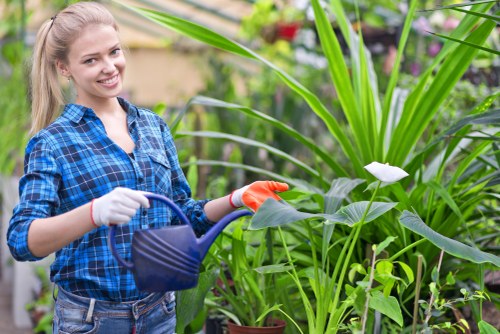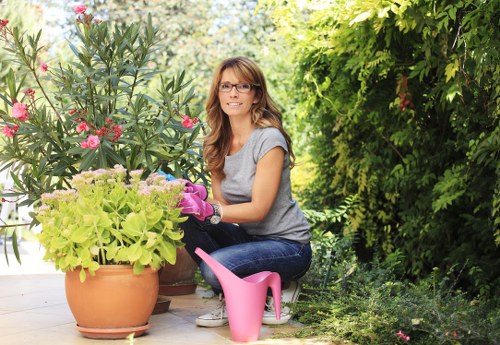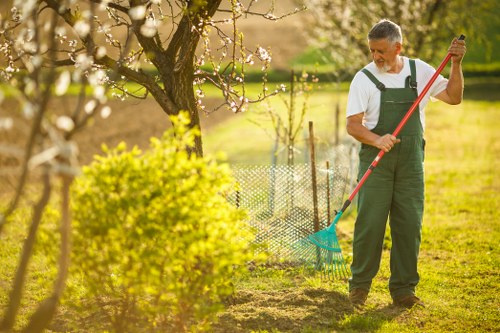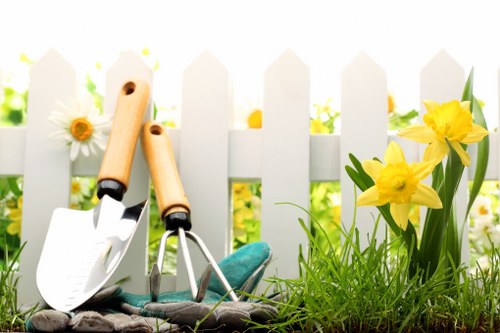Driveway Algae Removal Kingston

Maintaining a clean driveway is essential for both the aesthetic appeal and safety of your home. In Kingston, the damp climate often leads to the growth of algae on driveways, making surfaces slippery and unattractive. Understanding the causes, prevention methods, and effective removal techniques can help homeowners keep their driveways pristine.
Algae thrive in environments where moisture and shade are prevalent, making Kingston's weather conditions particularly conducive to their growth. Whether you have a concrete, asphalt, or paver driveway, addressing algae promptly can prevent long-term damage and preserve the integrity of your driveway.
This comprehensive guide explores the best practices for driveway algae removal in Kingston, offering solutions that are both effective and environmentally friendly.

Understanding Algae Growth on Driveways
Algae are simple, plant-like organisms that flourish in moist and shaded areas. On driveways, they can settle in cracks and crevices, creating a slippery surface that poses safety hazards. The primary factors contributing to algae growth include:
- Moisture: Kingston's frequent rain and damp conditions provide the perfect environment for algae to thrive.
- Shade: Areas with limited sunlight, such as north-facing driveways or those surrounded by trees, are more susceptible to algae growth.
- Organic Debris: Leaves, dirt, and other organic materials can accumulate on driveways, offering a food source for algae.
Different types of algae may require specific removal techniques, but understanding their growth patterns is the first step in effective eradication.

Effective Methods for Algae Removal
1. Pressure Washing
Pressure washing is a popular method for removing algae from driveways. It involves using high-pressure water jets to dislodge and wash away algae buildup.
Pros:
- Quick and effective for large areas.
- Removes dirt and debris along with algae.
Cons:
- Can potentially damage driveway surfaces if not done correctly.
- Requires access to a pressure washer.
2. Chemical Cleaners
Chemical algae killers are available in various forms, including sprays, foams, and liquids. These products are designed to kill algae and prevent future growth.
Pros:
- Effective for stubborn algae growth.
- Long-lasting prevention when used regularly.
Cons:
- May contain harsh chemicals that are harmful to the environment.
- Requires careful application to avoid damage to surrounding vegetation.

Natural and Eco-Friendly Solutions
For environmentally conscious homeowners, there are natural methods to combat driveway algae:
1. Vinegar Solution
A mixture of vinegar and water can effectively kill algae. Spray the solution onto the affected areas and let it sit for 15-20 minutes before scrubbing with a brush.
2. Baking Soda
Sprinkling baking soda over algae-covered areas can help neutralize the acidity and reduce algae growth. Scrub the area after application for best results.
3. Lawn Bleach
Lawn bleach, which is less concentrated than regular bleach, can be used as a safer alternative. Dilute it with water and apply to the algae, then rinse thoroughly.

Preventing Future Algae Growth
Prevention is key to ensuring your driveway remains algae-free. Here are some effective strategies:
- Improve Drainage: Ensure that water does not accumulate on your driveway by maintaining proper drainage systems.
- Reduce Shade: Trim surrounding trees and shrubs to allow more sunlight to reach your driveway, discouraging algae growth.
- Regular Cleaning: Keep your driveway clean by removing organic debris and washing away moisture regularly.
- Seal Your Driveway: Applying a sealant can create a barrier that prevents moisture from seeping into the surface, reducing algae growth.
Hiring Professional Algae Removal Services in Kingston
While DIY methods can be effective, hiring professionals offers several advantages:
- Expertise: Professionals have the knowledge and experience to tackle severe algae infestations safely.
- Advanced Equipment: They use specialized tools and products that deliver superior results.
- Time-Saving: Professionals can complete the job more quickly, allowing you to focus on other tasks.
When selecting a service, consider factors such as customer reviews, service offerings, and pricing to ensure you receive quality care for your driveway.
Local Relevance: Nearby Areas to Kingston
Driveway algae removal services are available not only in Kingston but also in the surrounding areas. Here are some nearby regions where residents can access these services:
- Fairfield: Located just north of Kingston, Fairfield benefits from rapid response times for algae removal.
- Winchester: Southwest of Kingston, Winchester homeowners can access specialized algae treatment services.
- Archer: East of Kingston, Archer offers a range of driveway maintenance services, including algae removal.
- Lovell Park: Southeast of Kingston, Lovell Park residents can find eco-friendly algae removal options.
- Macaulay: West of Kingston, Macaulay provides comprehensive driveway cleaning services.
- Pleasant Lake: Northeast of Kingston, Pleasant Lake has several local businesses specializing in algae control.
- Indian Line: South of Kingston, Indian Line offers both DIY supplies and professional services.
- Monroe: Northwest of Kingston, Monroe residents can benefit from advanced pressure washing techniques.
- Sharon: Adjacent to Kingston, Sharon has experienced professionals for effective algae removal.
- Pineville: North of Kingston, Pineville homeowners can access reliable driveway maintenance services.
- Morriston: Southeast of Kingston, Morriston offers a variety of algae treatment solutions.
- Hannon: West of Kingston, Hannon residents can find affordable and efficient driveway cleaning options.
- Williamsonville: Northeast of Kingston, Williamsonville provides specialized algae removal services.
- Storesville: Far north of Kingston, Storesville homeowners have access to professional driveway care.
Conclusion
Driveway algae can be a persistent issue for homeowners in Kingston, but with the right knowledge and tools, it can be effectively managed and prevented. Whether you choose to tackle the problem yourself or hire professionals, taking proactive steps ensures a safe and beautiful driveway year-round.
Frequently Asked Questions
1. How often should I clean my driveway to prevent algae growth?
Regular cleaning, ideally every few weeks during the damp seasons, can help prevent algae buildup. Additionally, periodic maintenance checks can identify and address issues early.
2. Are there eco-friendly solutions for algae removal?
Yes, natural remedies like vinegar, baking soda, and lawn bleach are effective and environmentally friendly options for algae removal. These alternatives minimize chemical impact on the surrounding environment.
3. Can algae damage my driveway?
While algae itself doesn't cause structural damage, it can make surfaces slippery and, over time, the moisture associated with algae growth may contribute to surface deterioration.
4. Is it better to hire a professional or try DIY algae removal?
Hiring a professional ensures thorough and safe removal, especially for severe infestations. However, for minor algae growth, DIY methods can be effective and cost-efficient.
5. How can I prevent algae from returning after removal?
Improving drainage, reducing shade, and performing regular maintenance are key strategies to prevent algae from returning. Sealing your driveway can also create a barrier against moisture intrusion.


